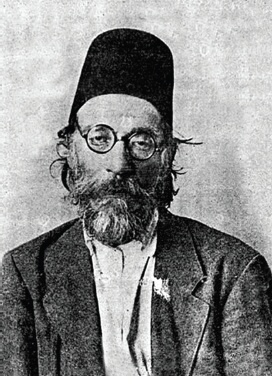Al-Zahawi: Iraqi Anti-Establishment Poet

By Luke McMahan/ Arab America Contributing Writer
Jamil Sidqi Al-Zahawi (جميل صدقي الزهاوي) was born in Baghdad in 1863 to a religiously conservative family, with his father serving as the Grand Mufti of an Iraqi Ottoman province. Although initially educated in classical Islamic disciplines, he developed an interest in modern natural sciences through the Arabic magazine Al-Muqataf. He held several official positions but was best known for his controversial poetry and academic writing. Due to his reputation as an anti-establishment thinker, he was often compared to the 10th-century poet Al-Ma’arri, known for his anti-theistic views and author of the Epistle of Forgiveness. Al-Zahawi’s most notable work, “Revolt in Hell,” has frequently been compared to the Epistle, as both involve a journey through heaven and hell filled with ironic criticism and imagery rooted in classical Islamic thought.
Controversial Views
Al-Zahawi’s two most significant theoretical positions were centered around the role of science in Islam and women’s rights. In a particularly inflammatory paper he wrote in 1910 on the latter topic, he argued for the abandonment of the hijab in Muslim societies. He began the paper by celebrating his mother and the role she played in his life, then extended his praise to women in general. Al-Zahawi criticized the widespread patriarchal attitudes and the stagnation of women’s rights development in a religion that, at its inception, had represented improvements in this regard (by 7th-century standards). He argued that practices like the hijab collectively undermine the strength of Muslim societies, especially in comparison to the West. This article garnered significant criticism, and Al-Zahawi even feared for his life for a brief period following its publication.
Revolt in Hell
Al-Zahawi followed in the anti-establishment spirit of Al-Ma’arri with perhaps his foremost artistic achievement, the long-form poem Revolt in Hell (ثورة في الجحيم). The poem begins with Al-Zahawi imagining a post-mortem interrogation by two angels, who question him about his adherence to specific religious practices and tenets. He defends his piety as a Muslim but admits that scientific curiosity has introduced doubt into his life. At this admission, the angels condemn him to hell. Al-Zahawi wonders why they had not instead inquired about his virtues, values, life work, and artistic achievements. Now doomed, the angels drag him up to heaven to observe its glories, including abundant food and drink and beautiful women, before leaving him to his torment. In hell, the poet encounters significant artists and scientists from past ages, such as Socrates, Spinoza, Abu Nuwas, and Ibn Sina. An unnamed youth incites the crowd to rise up against the heavens, waging war on the angels and shaking the throne of God. They emerge victorious, removing the truly wicked from paradise. Finally, the poet wakes up, revealing the entire episode to be merely a nightmare.
Aristotelian View
While deeply intrigued by natural sciences and modern rationality, Al-Zahawi did not succeed as a pure theorist or philosopher, as he struggled to grasp these disciplines accurately enough to make significant progress. His greatest legacy lies in his attempt to reconcile this knowledge within a religious culture he viewed as overly strict and rigid regarding doctrinal adherence. He used poetry to propagate his anti-establishment thinking, yet he remained a Muslim throughout his life. In Revolt in Hell, he presents an alternate, more pantheistic or Aristotelian view of God as an ether or spirit, rather than a traditionally conceived being actively influencing human lives. Despite the poem’s depiction of a revolution that restores to heaven only the truly moral and those who dedicated their lives to advancing human knowledge, the throne of God shakes but does not fall. Al-Zahawi continues to support Islam as a way of life and guiding principle but critiques those who were overly obsessed with every word of a book written centuries prior without accommodating modern science or rationality. Similar to Rushdie and Mahfouz, Al-Zahawi can counter any claims of promoting an anti-Islamic message by framing the events of the poem as merely a dream.
Legacy
In his poetry and other academic works, Al-Zahawi remained a religious man haunted by the advancements of modern science. He advocated for the adoption of these methods and theories, as outright ignorance or opposition to them only harms Muslim societies, as seen in his stance on hijabs. His greatest weapon in this revolutionary endeavor was his poetry, which rhetorically led his and his accusers’ ideologies to their logical conclusion. He envisions a future figure carrying out the revolution he could only imagine; in Revolt in Hell, the instigator of the eponymous struggle is not Al-Zahawi himself or any of the prominent thinkers and artists mentioned, but an unnamed youth.
Check out our blog here.









